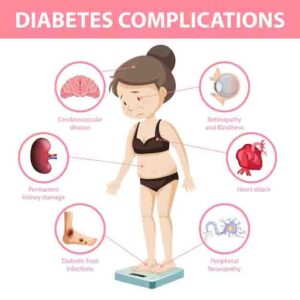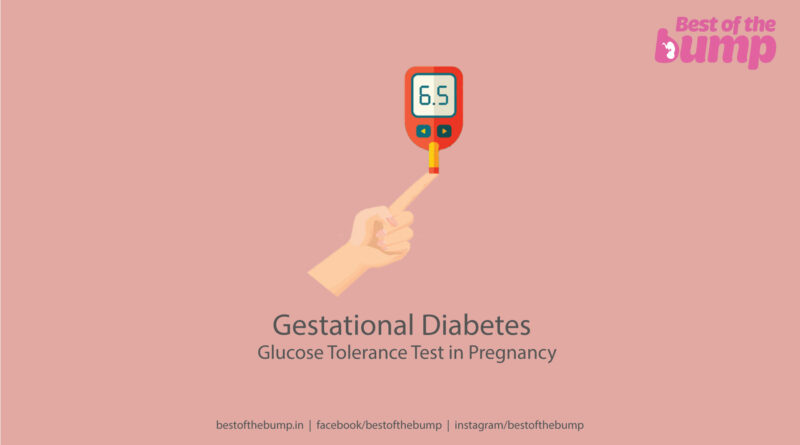Gestational Diabetes – Glucose Tolerance Test in Pregnancy
Pregnancy is a beautiful and transformative phase in a woman’s life, filled with joy and excitement as she eagerly anticipates the arrival of her little one. However, along with the happiness, pregnancy also brings some health concerns that need to be addressed to ensure a smooth and safe journey for both the mother and the baby. One such concern is gestational diabetes, a condition that affects some pregnant women and requires timely detection and management.
What is Gestational diabetes?

Gestational diabetes is a type of diabetes that develops during pregnancy. It occurs when the body is unable to produce enough insulin to meet the increased demands of pregnancy. Insulin is a hormone that helps regulate blood sugar levels, and during pregnancy, the placenta produces hormones that can interfere with the action of insulin, leading to high blood sugar levels. If left untreated, gestational diabetes can pose several risks to both the mother and the baby.
How To detect Gestational diabetes
To detect gestational diabetes, healthcare providers recommend two tests:
- The Glucose Screening Test (GCT) and
- The Glucose Tolerance Test (GTT).
These tests are usually performed between weeks 24 and 28 of pregnancy, as this is the time when the placenta is producing higher levels of hormones that can impact insulin function.

The Glucose Screening Test (GCT) is a straightforward and essential test that every expectant mother should take. It involves drinking a sweet glucose solution, and after an hour, a blood sample is taken to measure blood sugar levels. While the GCT is not diagnostic, it helps identify women who may have elevated blood sugar levels and need further evaluation with the Glucose Tolerance Test (GTT).
If the results of the GCT indicate higher than normal blood sugar levels, the healthcare provider will recommend the Glucose Tolerance Test (GTT) for a more accurate diagnosis. During the GTT, the pregnant woman is asked to fast overnight. Then, a fasting blood sugar level is measured, followed by consuming a larger dose of the glucose drink. Blood samples are taken at hourly intervals for the next three hours to measure blood sugar levels. Based on the results, a diagnosis of gestational diabetes can be made.
Receiving a positive diagnosis of gestational diabetes may cause anxiety and concern for the expectant mother. However, it’s essential to remember that with proper management and support from the healthcare team, most women can successfully manage gestational diabetes throughout their pregnancy.
Managing gestational diabetes

Managing gestational diabetes involves making dietary and lifestyle changes. Your healthcare provider will work with you to develop a personalized meal plan that focuses on healthy eating and controlling blood sugar levels. Regular physical activity is also encouraged, as it helps improve insulin sensitivity and contributes to overall well-being.
In some cases, dietary and lifestyle modifications may not be enough to control blood sugar levels, and insulin or other medications may be prescribed by your healthcare provider. It’s essential to follow the treatment plan diligently and attend regular check-ups to monitor blood sugar levels and ensure the health of both the mother and the baby.
The good news is that gestational diabetes typically resolves after giving birth. However, women who have had gestational diabetes are at a higher risk of developing type 2 diabetes later in life. Therefore, it’s essential to maintain a healthy lifestyle after pregnancy to reduce this risk.
Additionally, having gestational diabetes does not necessarily mean that your baby’s health will be affected. However, uncontrolled gestational diabetes can increase the risk of complications for the baby, such as macrosomia (a large baby), respiratory distress syndrome, low blood sugar levels (hypoglycemia), and an increased risk of developing type 2 diabetes later in life. This is why early detection and proper management of gestational diabetes are crucial for ensuring the best outcomes for both the mother and the baby.
In conclusion, pregnancy is a time of great joy and excitement, but it also requires vigilant monitoring of health concerns such as gestational diabetes. The GCT and GTT are essential tests that help identify and manage gestational diabetes, ensuring a safe and healthy pregnancy journey for both the expectant mother and her baby. With proper medical guidance, dietary adjustments, and lifestyle changes, most women with gestational diabetes can navigate through their pregnancy with confidence and look forward to the arrival of their bundle of joy. Remember to communicate openly with your healthcare provider, follow their advice diligently, and embrace the journey of motherhood with optimism and positivity.
Remember, taking these tests and addressing any health concerns during pregnancy is essential for the well-being of both you and your baby. Your healthcare team will provide the necessary support and guidance to ensure a healthy pregnancy journey.




